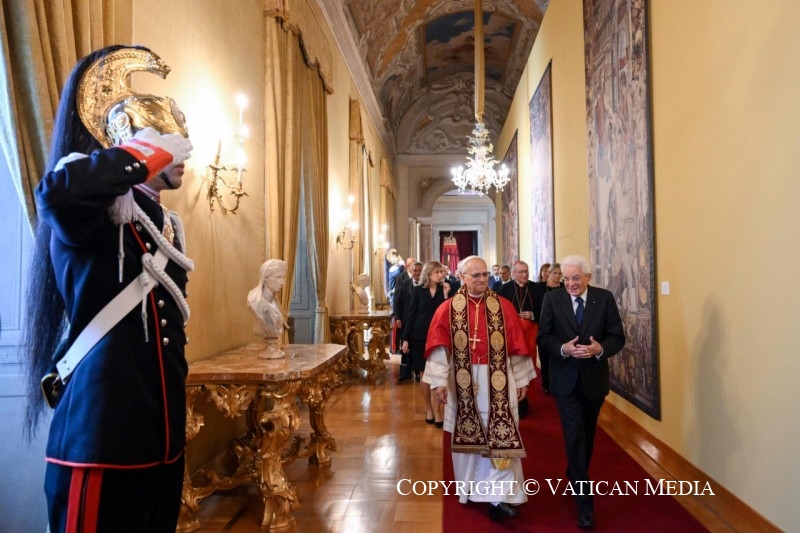Leo XIV highlights multilateralism, family, acceptance as paths for peace and development
Today the pontiff visited the Quirinal Palace in Rome, the former papal palace, now the residence of the President of the Italian Republic. It was a symbolic visit centred on the relationship between the Church and politics. The pontiff called for life to be protected at every stage, from conception to old age. He urged the faithful not to let themselves be captivated by uniform and fluid cultural models.
Rome (AsiaNews) – Pope Leo XIV today made his first official visit to the Quirinal Palace, the residence of the President of the Italian Republic.
"Multilateralism is a crucial value,” he said in his address. “The complex challenges of our time make it more necessary than ever to seek and adopt shared solutions. Therefore, it is essential to implement its dynamics and processes, remembering its original objectives, aimed primarily at resolving conflicts and promoting development."
Papal visits to this historic palace, which was the papal residence in Rome under the Papal States, are traditionally a major event in the relationship between the Holy See and the Italian state, and more generally between the Catholic Church and politics.
The tradition began in Italy in 1929 after relations between two sides broke down in 1870, when the Kingdom of Italy, founded a few years earlier, seized Rome, forcing the pope to take refuge in what would later become the small Vatican City State.
Italian President Sergio Mattarella welcomed Leo XIV, greeting the pontiff with words about the crisis of a "world built on multilateralism" and of "a system that provided for dialogue to resolve disputes", while today the "logic of the strongest and the temptation to resort to arms" dominate.
Citing Russia's aggression against Ukraine and the need to transform the "spark of hope" in the Holy Land into "true and lasting peace," Mattarella emphasised the importance of “disarming minds and words," as Leo suggested in the very first words of his pontificate.
For his part, the pope stressed peace as the "first commitment," echoing the words of his predecessors, starting with Benedict XV's warning, more than a century ago, that war was a "useless slaughter”.
“I express my appreciation,” he added, “for the Italian government's commitment to addressing the many situations of hardship linked to war and poverty, particularly regarding the children of Gaza, also working with the Bambino Gesù Hospital. These are strong and effective contributions to building a dignified, peaceful, and prosperous coexistence for all members of the human family.”
Citing the upcoming eighth centenary of the death of Saint Francis of Assisi, which will be celebrated in 2026, Leo XIV underscored the urgency of “caring for our 'common home’.”
He also focused on the problem of the declining birth rate, a growing issue not only in Europe.
“I would like to emphasise," he said, "the importance of ensuring all families the indispensable support of dignified work, under fair conditions and with attention to the needs of motherhood and fatherhood. Let us do everything we can to give confidence to families, especially young families, so that they can look to the future with serenity and grow in harmony.”
This issue, he noted, is also linked to “the respect and protection of life, in all its stages, from conception to old age, up to the moment of death.
“I hope,” he added, “that this awareness continues to grow, also regarding the accessibility of medical care and medicines, according to each individual's needs.”
On the topic of welcoming migrants, Leo XIV praised Italy's generosity, but also the complexity of the challenges posed by this problem.
“I encourage you to always maintain a lively attitude of openness and solidarity. At the same time, I would like to emphasise the importance of constructively integrating new arrivals into the values and traditions of Italian society, so that the mutual giving that takes place in this meeting of peoples is truly for the enrichment and good of all.
"In this regard, let me stress how precious it is for each of us to love and share our own history and culture, with its signs and expressions. The more we recognise and serenely love what we are, the easier it is to encounter and integrate others without fear and with an open heart.”
In light of this, “Let us not despise what our ancestors experienced and what they passed on to us, even at the cost of great sacrifices," he explained.
“Let us not allow ourselves to be captivated by mass-produced and fluid models that promote but a semblance of freedom, only to make people dependent on forms of control, passing fads, commercial strategies, or more.
“Cherishing the memory of those who came before us, treasuring the traditions that have made us what we are, is important for looking to the present and the future with awareness, serenity, responsibility, and a sense of perspective.”
11/11/2024 16:52
01/04/2019 10:28
10/05/2025 11:18







.png)










